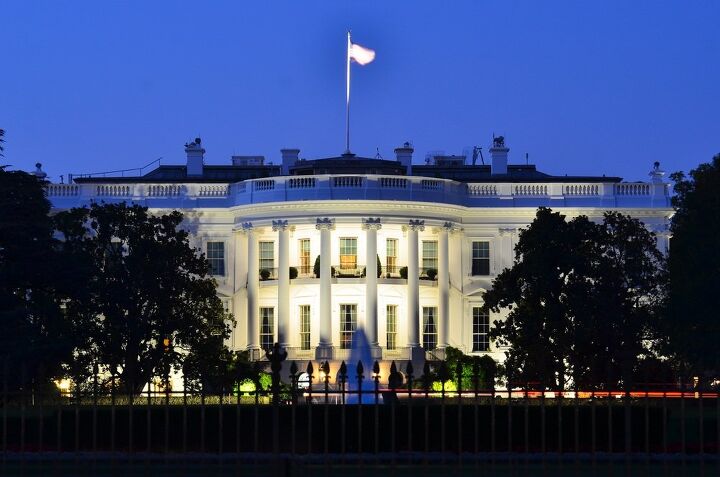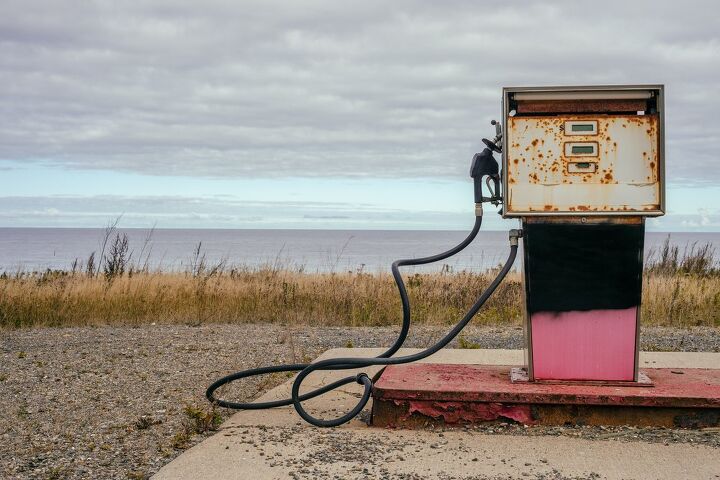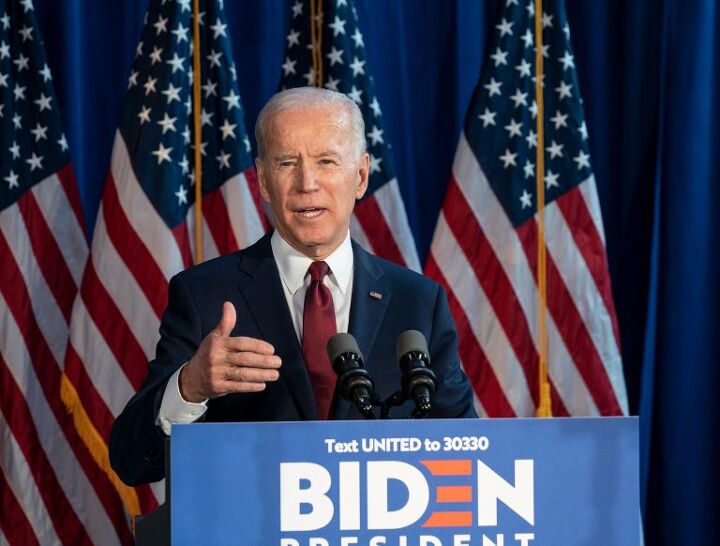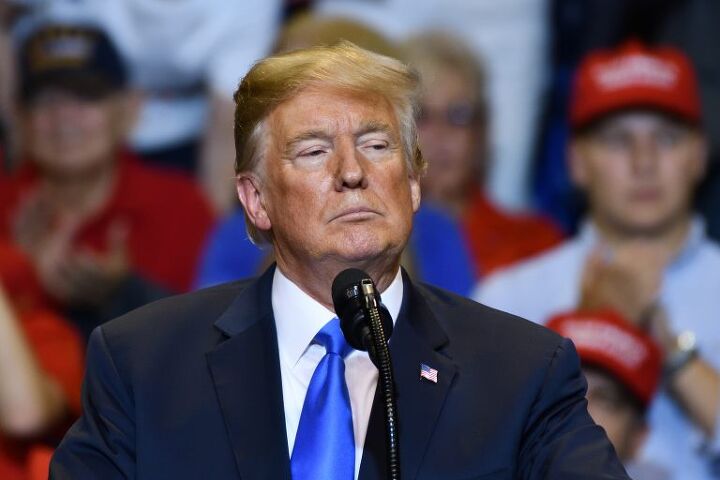#DonaldTrump
White House Briefly Mentions Fixing Our Horrible Roads
On Thursday, President Joe Biden spent part of his day listening to a group of lawmakers discuss how much the United States might need to spend on fixing its horrible infrastructure. It’s an issue America has neglected through multiple administrations and has frequently been set back by partisan conflict.
Considering the White House is ruminating on how to source trillions of dollars in new infrastructure spending after the U.S. just printed $9 trillion (almost 25 percent all USD currently in circulation) for COVID relief, that’s unlikely to change. Everyone is worried about raising taxes and causing inflation during a period of economic uncertainty, or skeptical that the government will use the new funding responsibly. But our roads (among other infrastructure projects) are reaching a point where they can no longer be ignored, placing the entire country in a particularly sour pickle.
Pardon Me, Did I Do Something Wrong?
Among those receiving a Presidential pardon included Anthony Levandowski and Elliott Broidy. Trump’s largesse was noted in a story on Autoblog that appeared earlier today.
Gas War: Ford Urges Other Automakers to Join the Californian Coalition
The Ford Motor Company is asking automakers to join it in supporting Californian vehicle emissions targets aimed at supplanting the rollback that was supposed to become the national standard. General Motors has already abandoned its support of the Trump rollbacks, which offered concessions to appease environmental groups but ultimately targeted more lax fueling regulation while seeking to eliminate California’s ability to self regulate as a way to curb its influence. But industry leaders are under the impression that a President Biden would attempt to swiftly transmission back to Obama-era regulatory targets or simply adopt the California model that’s been at odds with the national standards established by the Trump administration.
Considering how aggressive the Biden-Harris energy/environmentalism platform is, it certainly seems a plausible scenario and certain automotive executives feel that it would be best to go into 2021 aligned and supportive. The matter is even scheduled to be brought forward during Tuesday’s virtual auto trade association meeting.
GM Switches Sides in the Gas War, Joins California/Biden
General Motors has changed its mind on backing the Trump administration’s effort to supplant Obama-era emission regulations with something more manageable and prohibit California from setting its own emissions rules. Of course, the coastal rules aren’t really just for California — it desperately wants to export them to the rest of the country and has made rather incredible headway for not being the federal government. The coastal region has already convinced over 20 states to follow in its footsteps and even amassed support from auto manufacturers like BMW, Ford, Honda, and Volkswagen Group.
Other automakers, including General Motors, felt the Trump plan would give them more flexibility and undoubtedly make them less subject to government fines. However, with a Biden presidency assured without Trump and Co. having an extremely powerful voter fraud case, GM has become a turncoat. On Monday, CEO Mary Barra issued a letter to environmental groups stating that her company is “immediately withdrawing from the preemption litigation and inviting other automakers to join us.”
GM now wants to work with Joe Biden — probably because the company understands his administration is going to be regulating the snot out of the nation.
Gas War: Biden Selects 'Obama All Stars' for Transportation Department, EPA
With America currently split between people arguing about how seriously the 2020 election needs to be investigated, there hasn’t been much in the news about cars beyond the omnipresent background hiss of manufacturers promoting green vehicles they have yet to build. That leaves us having to belly crawl through journalistic muck in the hopes of finding a morsel of useful information. Fortunately, we located a crumb worth saving in Joe Biden’s transition teams for the Environmental Protection Agency and Transportation Department.
A Biden administration means bringing back Obama all-stars in a concentrated effort to restore that era’s regulatory standards. That entails flipping just about every single initiative launched by President Trump, including the national fuel rollback that’s at the heart of the Gas War. Biden has also said he would reenter the Paris Climate Accords, gradually abandon fossil fuels, and “establish ambitious fuel economy standards” surpassing anything the nation has seen before.
German Auto Lobby Wants Biden to Eliminate U.S. Trade Restrictions
Germany is eager to see the United States abolish trade barriers implemented by President Donald Trump now that it looks like Joe Biden has won the 2020 election. While that could all be undone by the sudden influx of legal actions taken by the Trump campaign as presumptive evidence of election impropriety streams in, Germany would still like to get the ball rolling on trade with the Democrats.
The nation’s automotive industry is petitioning leadership in the U.S. and European Union to align technical/regulatory standards and minimize the existing trade barriers. The German Association of the Automotive Industry (Verband der Automobilindustrie) or VDA has already endorsed the proposal with the lobby group’s president confirming its position in a recent webcast hosted by the Frankfurt business media club ICFW (Internationale Club Frankfurter Wirtschaftsjournalisten).
Volkswagen CEO Says Biden Win Better Suits Corporate Goals
As the U.S. election devolves into deciding which political party committed the most fraud, Volkswagen CEO Herbert Diess said a victory by Democrat Joe Biden would be the ideal outcome for any German automakers seeking to mass-produce electric cars. Hardly surprising, considering the Biden-Harris campaign website says it would regulate the dickens out of fossil fuels, moving aggressively toward alternative energy sources and electrification while pressing other nations to do the same.
“A Democratic program probably would be more aligned with our worldwide strategy, which is really to fight climate change, to become electric,” the CEO told Bloomberg on Thursday.
QOTD: Which POTUS Candidate Would Be Best for Autos?
Buckle up kids — it’s Election Day in America, and we’re about to get political.
Before we do, some rules. Don’t follow them, and the merciless banhammer will find you.
Automotive Politics: A Tale of Two Industries?
Politics have corrupted just about everything under the sun over the last few years. Practically everything is political in 2020 and if you have an opinion about that, it had better be the correct one and sanctioned by your preferred party. After all, having an approved take is far more important that an accurate one. But what of the automotive industry? Where do the carmakers fall on the supposedly important spectrum?
Well, we know that the UAW predictably endorsed Joe Biden for president way back in spring. But those heading the companies distributing union members’ paychecks quite literally came to Donald Trump in 2017 to ask that he take it easy on them. Obama-era regulations had made efficiency mandates so strict, that automakers had become convinced they’d be unable to meet them in the years ahead. While Trump’s relationship with the industry often runs hot and cold, he pushed for a fueling rollback that placed federal authorities at odds with California and kicked off a regulatory conflict of epic proportions.
Assuming Biden wins the election, those stringent emissions mandates will undoubtedly come back into play — surrounded on all sides by his climate and environmental justice proposal, which makes a federal investment of $1.7 trillion over the next 10 years. While automotive exclusives are hesitant to share their regulatory fears with the general public, especially as they attempt to put on the greenest face possible for marketing purposes, there are real concerns that the U.S. could embrace policies similar to Europe. That could force a change of course for a few companies and complicate the overall trajectory for the U.S. market.
Donald Trump is Wrong About Fuel Economy and Safety
President Donald Trump has consistently defended his administration’s attempts to roll back Obama-era fuel-economy standards by complaining that building cars with better fuel economy in mind makes them less safe and more expensive.
He brought it up again during the presidential debate last night.
This is, to be quite frank, bullshit.
Silver and Gold: Nevada Joins California in the Gas War
On Monday, Nevada Governor Steve Sisolak announced that his state will embrace California-crafted emissions rules that are at odds with the national rollback finalized by the Trump administration in March.
Officially, Sisolak said the rules would not require residents to abandon their current ride “or choose one that does not work for their lifestyle or business needs.” Nevada has, however, decided to adopt higher mpg standards, as well as the Golden State’s zero-emission vehicle (ZEV) rules that require manufacturers to sell a certain number of electric or plug-in hybrid models each year based on the total number of vehicles sold within the state.
Companies in compliance accrue ZEV credits, which can then be traded or sold to other manufacturers for money. As with the Corporate Average Fuel Economy (CAFE) system, those that cannot hit their targets (or afford to buy up credits) will be fined. Tesla actually used such arrangements to make $594 million off its rivals in 2019, with the prospect of things only getting more lucrative for the all-electric brand.
Gas War: States Sue Trump Administration Over Fuel Rollback
Following America’s fueling feud has shown your author that it’s less about finding a reasonable compromise that works for consumers, the automotive industry, and environmental activists, and more about perpetuating ideological wars that now seem to surround every topic filtered through the news media.
Encouraged by industry leaders just days after taking office, President Donald Trump made the fuel economy rollback one of his first initiatives. It wasn’t until March that the softened final draft emerged, however, and it won’t be enough to conclude the almost four-year battle. A collection of 23 states filed suit against the Trump administration’s easing of emissions standards on Wednesday. They argue that the rollback is illegal and based on bunk information.
While we’ve also been suspect of some of the metrics used to make the rollback look more desirable, fueling standards haven’t adhered to reality in some time. The Obama-era standards that would have seen Corporate Average Fuel Economy (CAFE) rise to 54 mpg by 2025 were deemed unsustainable by that administration’s Environmental Protection Agency (EPA) and the National Highway Traffic Safety Administration (NHTSA), but were put into play anyway.
Gas War: Senator Asks EPA Watchdog to Investigate New Fuel Efficiency Rules
Every time we think the United States’ fueling fracas had concluded, something new emerges to remind us that we’re utter morons. Despite the Trump administration finally wrapping up the fuel rollback of Obama-era emission standards on March 31st, Senator Tom Carper (D-DE) has sent another letter asking Environmental Protection Agency Inspector General Sean O’Donnell to look into the new rules.
Carper asked the inspector general last February to conduct an investigation into “potentially unlawful efforts and procedural problems” stemming from their implementation. His assertion is that the EPA was circumventing various procedural requirements and attempted to hide data that would have conflicted with some of the rollback’s claimed benefits.
Did it?
Gas War: Justice Department Drops Antitrust Probe Against Automakers Siding With California
The United States Department of Justice has ended its investigation into Ford, Honda, Volkswagen, and BMW over a presumed antitrust violation stemming from a deal they made with California to adhere to regional emission rules. Their agreement technically circumvents the current administration’s plan to freeze national emissions and fuel economy standards — established while President Obama was still in office — at 2021 levels through 2026. Under the California deal, the automakers promised to comply with pollution and gas mileage requirements that are more stringent than the federal standards suggested in the rollback proposal.
But the probe also looked like retaliation from the Trump administration against automakers publicly siding with the state causing the most trouble in the gas war. Under the deal, the automakers promised to comply with pollution and economy requirements that are tougher than proposed federal standards. Despite the corporate promise being as empty as an Oscar speech, it was still an affront to the current administration’s efforts to tamp down lofty efficiency targets put in place just days before it came into power.
While the Justice Department hasn’t explicitly said why it closed the investigation, it’s presumed that it simply didn’t find anything that it felt violated antitrust laws. California Governor Gavin Newsom said on Friday that he wasn’t surprised by the decision, stating that the “trumped-up charges were always a sham, a blatant attempt by the Trump administration to prevent more automakers from joining California and agreeing to stronger emissions standards.”
U.S. Fuel Rollback Earns Pushback From Scientific Advisory Board
The Environmental Protection Agency’s (EPA) Scientific Advisory Board (SAB) is once again applying pressure on the Trump administration’s proposed fuel economy rollback. Similar to the complaints issued by a coalition of scientists back in March of 2018, the board expressed concerns that significant weaknesses exist in the analysis underpinning the plan that should be addressed before any rules are made final. A draft report was circulated earlier in the week, with the SAB scheduling a public meeting meeting on January 17th.
“[The] EPA always appreciates and respects the work and advice of the SAB,” the U.S. regulatory agency said in a statement. “When implemented, the [rollback] will benefit all Americans by improving the U.S. fleet’s fuel economy, reducing air pollution, and making new vehicles more affordable for all Americans.”




























Recent Comments